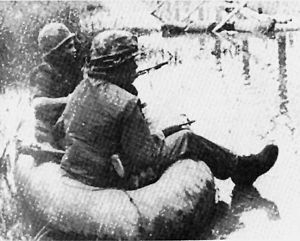
Back نزاع المنطقة الكورية منزوعة السلاح Arabic Conflicto de la zona desmilitarizada de Corea Spanish Conflit de la zone coréenne démilitarisée French Konflik Zona Demiliterisasi Korea ID Conflitto della zona demilitarizzata coreana Italian 한반도 비무장 지대 분쟁 Korean Conflito na Zona Desmilitarizada da Coreia Portuguese Конфликт в корейской демилитаризованной зоне (1966—1969) Russian 朝韩非军事区冲突 Chinese
| Korean DMZ Conflict | |||||||||
|---|---|---|---|---|---|---|---|---|---|
| Part of the Korean conflict | |||||||||
 American and South Korean soldiers at the DMZ, on 26 August 1967. | |||||||||
| |||||||||
| Belligerents | |||||||||
|
| |||||||||
| Commanders and leaders | |||||||||
|
| |||||||||
| Casualties and losses | |||||||||
|
South Korea: 299 killed 550 wounded[1]: 112 1 patrol craft sunk[2] United States: 75 killed 111 wounded 85 captured and later released[1]: 112 2 jeeps destroyed 2 aircraft 1 technical research vessel captured |
397 killed At least 23 wounded 33 captured and defected 12 soldiers and 2,462 agents captured [1]: 112 | ||||||||
|
| |||||||||
| History of North Korea | ||||||||||||||||||||||||||||||||||||||||||||
|---|---|---|---|---|---|---|---|---|---|---|---|---|---|---|---|---|---|---|---|---|---|---|---|---|---|---|---|---|---|---|---|---|---|---|---|---|---|---|---|---|---|---|---|---|
 | ||||||||||||||||||||||||||||||||||||||||||||
|
||||||||||||||||||||||||||||||||||||||||||||
|
| ||||||||||||||||||||||||||||||||||||||||||||
The Korean DMZ Conflict, also referred to as the Second Korean War by some,[3][4] was a series of low-level armed clashes between North Korean forces and the forces of South Korea and the United States, largely occurring between 1966 and 1969 along the Korean Demilitarized Zone (DMZ).
- ^ a b c Bolger, Daniel (1991). Scenes from an Unfinished War: Low intensity conflict in Korea 1966–1969 (PDF). Diane Publishing Co. ISBN 978-0788112089. Archived (PDF) from the original on 7 September 2021.
 This article incorporates text from this source, which is in the public domain.
This article incorporates text from this source, which is in the public domain.
- ^ Cite error: The named reference
Martawas invoked but never defined (see the help page). - ^ Mitchell Lerner (December 2010). "'Mostly Propaganda in Nature:' Kim Il Sung, the Juche Ideology, and the Second Korean War" (PDF). The North Korea International Documentation Project. Archived from the original (PDF) on 15 June 2013. Retrieved 3 May 2012.
- ^ Cosmas, Graham (2009). The Joint Chiefs of Staff and The War in Vietnam 1960–1968 Part 3 (PDF). Office of Joint History Office of the Chairman of the Joint Chiefs of Staff. p. 152. ISBN 978-1482378696.
 This article incorporates text from this source, which is in the public domain.
This article incorporates text from this source, which is in the public domain.
© MMXXIII Rich X Search. We shall prevail. All rights reserved. Rich X Search